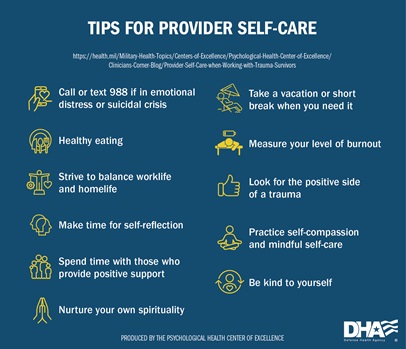By Amanda Edwards-Stewart, Ph.D., ABPP
April 5, 2023

PHCoE Graphic
Working with survivors of traumatic events can tax behavioral health care workers. Hearing about acts that disregard an individual’s autonomy, boundaries, uniqueness, and right to their body can be stressful. I started working with trauma survivors early in my career. First, I worked in an intensive outpatient program for women who survived sexual trauma. Then, for the Department of Defense, where I served as a therapist on various research studies among service members with posttraumatic stress disorder receiving exposure therapy. One positive aspect of providing exposure therapy, such as Prolonged Exposure (PE),1 is the provider habituates to the trauma narrative along with the patient. But, I still hear their stories, and some have significant impacts on my life due to my own personal views of the world or life experiences.
One past patient’s narrative still comes to mind; it was probably the worst trauma narrative I ever heard. I sobbed after our session. I still tear up thinking about it. I dreamt of the mental image I created from his description for the next two nights.
My story and experience are not unique. Providers primarily working with trauma survivors can develop stress reactions depending on patient contact hours per week and trauma severity.2 Acute stress and posttraumatic stress disorders can now be diagnosed based on “…repeated or extreme exposure to adverse details of the traumatic event(s).”3 Therefore, if my response to this patient’s narrative included more symptoms and lasted at least a month after hearing it, I could be diagnosed with PTSD. Before the 2013 change in diagnosis for ASD and PTSD, a provider stress response was termed secondary traumatic stress (STS).4 In a study of 430 medical personnel who help trauma survivors, 56.6% of participants reported low to moderate STS symptoms while 43.4% reported high symptoms. Specifically, high STS was reported in 43.3% of paramedics and 43.6% of nurses.4 Rates of STS were also reported between 4% to 13% among first responders.5
A wealth of research links various provider thoughts and behaviors to provider resilience. In one survey of 371 mental health providers, self-care activities (listed below) effectively decreased compassion fatigue.6 In another study of paramedics and nurses who experienced secondary posttraumatic growth (SPTG), SPTG was positively associated with social support and positive cognitive coping strategies (i.e., finding the positive side in the traumatic experience, downward comparison, and acceptance of the trauma).7 Furthermore, variables associated with professional quality of life for palliative care providers were mindful self-care and self-compassion (i.e., responding to self with kindness and compassion for one’s suffering and mistakes).8 In summary, providers might consider the following self-care areas as a focal point for personal wellness when working with trauma survivors impacts their own mental health:
- Call or text 988 if in emotional distress or suicidal crisis
- Healthy eating6
- Strive to balance work life and home life6
- Make time for self-reflection6
- Spend time with those who provide positive support, particularly family and loved ones6
- Nurture your own spirituality6
- Take a vacation or short break from work when you need it6
- Measure your level of burnout
- Look for the positive side of a trauma7
- Practice self-compassion and mindful self-care8
Providers working with trauma survivors must practice what we ask our patients to do. We need to take care of ourselves and notice when we are having a powerful reaction to a patient’s content. I will be honest; I’m awful at self-compassion. I expect the best out of myself, and when I don’t perform at 100%, I only focus on what I did wrong and strategize how to improve. My biggest hurdle when working with this population is to let myself hurt when horrified by a patient’s story. It’s not necessary, or even appropriate, to tell the patient my reaction, but I need to give myself time to feel how profoundly wrong their experience was and accept that the world is not always kind. I should at least be kind to myself.
References
- Foa, E., Hembree, E. A., Rothbaum, B. O., & Rauch, S. (2019). Prolonged exposure therapy for PTSD: Emotional processing of traumatic experiences- Therapist Guide (2nd ed.). Oxford University Press.
- Rizkalla, N., Zeevi-Barkay, M., & Segal, S. P. (2021). Rape crisis counseling: Trauma contagion and supervision. Journal of Interpersonal Violence, 36(1–2), NP960–NP983. https://doi.org/10.1177/0886260517736877
- American Psychiatric Association (2013). Posttraumatic stress disorder. In Diagnostic and statistical manual of mental disorders (5th ed.). American Psychiatric Publishing.
- Ogińska-Bulik, N., Gurowiec, P. J., Michalska, P., & Kędra, E. (2021). Prevalence and predictors of secondary traumatic stress symptoms in health care professionals working with trauma victims: A cross-sectional study. PloS one, 16(2), e0247596. https://doi.org/10.1371/journal.pone.0247596
- Greinacher A, Derezza-Greeven C, Herzog W, Nikendei C. (2019). Secondary traumatization in first responders: a systematic review. Eur J Psychotraumatol, 10(1)
- La Mott, J., & Martin, L. A. (2018). Adverse childhood experiences, self-care, and compassion outcomes in mental health providers working with trauma. Journal of Clinical Psychology, 75, 1066-1083. https://doi.org/10.1002/jclp.22752
- Gurowiex, P. J., Ogińska-Bulik, N., Michalska, P., & Kedra, E. (2022). The relationship between social support and secondary posttraumatic growth among health care providers working with trauma victims: The mediating role of cognitive processing. International Journal of Environmental Research and Public Health, 19, 4985. https://doi.org/10.3390/ijerph19094985
- Garcia, A. C. M., Ferreira, A. C. G., Silva, L. S. R., Monterio da Conceicᾶo, V., Nogueira, D. A., & Mills, J. (2022). Mindful self-care, self-compassion, and resilience among palliative care providers during COVID-19 pandemic. Journal of Pain and Symptom Management, 64(1), 49-57.
Dr. Edwards-Stewart is a board certified, licensed clinical psychologist with clinical expertise in the areas of trauma, the process of change, personality assessments, and couples. She is the government lead of the Practice-Based Implementation Network at the Psychological Health Center of Excellence.